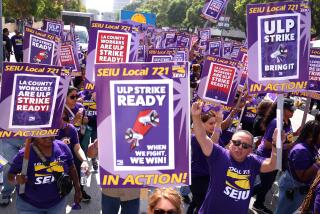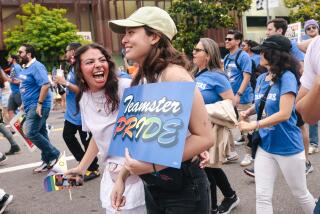MTA-Union Talks to Resume Amid News Blackout
- Share via
The Metropolitan Transportation Authority and union officials agreed Saturday to resume talks today under a news blackout and work toward a swift end to the crippling eight-day strike.
After meeting separately with state officials at the Pasadena Hilton, United Transportation Union head James Williams and the MTA board chairwoman, Supervisor Yvonne Brathwaite Burke, sat down face-to-face Saturday afternoon for the first time since talks disintegrated a day earlier.
Assemblyman Herb Wesson (D-Culver City), who was appointed Friday as a fact-finder for Assembly Speaker Bob Hertzberg (D-Sherman Oaks) to determine whether the state should play a role in talks, called the agreement “a breakthrough.” “We’re optimistic we’ll be able to get the buses rolling soon,” Wesson said.
Wesson would not offer reasons for the news blackout.
The MTA continued its anti-union ad campaign Saturday with a radio announcement saying, “We will not allow our passengers to be held hostage by drivers who make more money than most drivers in the state.”
MTA bus drivers earn the third-highest wages of all public transit bus drivers in California and the highest in Southern California.
One of the key issues dividing the sides is the MTA’s demand that unions yield $23 million in overtime and other savings over the next three years to help make up for a deficit, projected to reach more than $400 million in 10 years.
However, that issue meant little to the small-business owners in ethnic shopping districts in and around downtown Los Angeles, most of whom are losing 25% to 70% of their business because of the strike.
On Saturday, businesses in Koreatown, Chinatown, Little Tokyo and downtown Los Angeles lacked the bustling crowds that usually pack sidewalks on weekends. Workers, themselves without transportation, complained of exhaustion after a week of trudging to work on foot.
At Grand Central Market downtown, merchant Michael Lopez said Saturday his family weathered the last transit strike by cutting prices on the food staples they sell, such as beans, rice and coffee.
It may also come to that this time, Lopez said.
“We get enough business to make payroll, but barely,” he said. “We can survive maybe three weeks more. Then we’ll have to do something.”
Across Broadway Avenue, merchant Paolo Lopez said she has had to walk an hour one way from her Pico Union neighborhood to work at the Mexicana Discoteco Libreria.
When she arrived at the record store, however, customers were scarce. Next week, at least one employee may be laid off temporarily because of slow business, she said.
In Koreatown, weekend food shopping became a labor-intensive chore Saturday as weary shoppers trudged home, loaded down with bags.
“Our lives are upside down,” said Soon-Ok Kim as she carried two small plastic bags of groceries.
Before the strike, she stocked up on sale items, but now she buys what she can carry.
“I can only buy a few apples and pears and some vegetables at a time,” said Kim.
Around the corner, Shi-Kyo Kim and his daughter-in-law, Young-In Cho, walked home from Hannam Supermarket along Olympic.
“I’m exhausted from walking,” complained 65-year-old Kim as he wiped his forehead. His grandson’s stroller was loaded with vegetables.
“I’ve been walking everywhere this past week, and I don’t know how much longer I can manage,” he said. Kim said it takes him one hour each way to take his 4-year-old grandson to Childrens’ School at 8th and Kingsley streets.
He said, “Please tell those people at the bus company, little people like us are suffering.”
*
Times correspondent Gina Piccalo contributed to this story.
More to Read
Sign up for Essential California
The most important California stories and recommendations in your inbox every morning.
You may occasionally receive promotional content from the Los Angeles Times.











